Lead On, Al Perry
[This profile of Al Perry appeared in the December 2015 issue of Central California Life Magazine. It seems appropriate to present it again as the 12th Honor Flight visits Washington, DC with a contingent of 70 military veterans and their chaperones October 24-26. This will be Al Perry’s final flight. -BE]
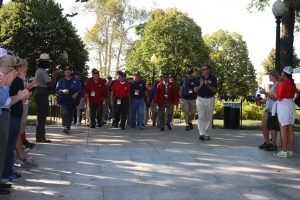
“I’ve got 63 World War II veterans on this plane, all of them over 85, some of them over 95, half in wheelchairs, none have eaten a real meal all day, we’re four hours behind schedule, and I need to know whether I can count on you to feed them when we get there.” Al Perry, President of the Central Valley Honor Flights, burns a few minutes of precious phone time with Mission BBQ in Baltimore, Maryland while on a re-fueling stop in Wichita, Kansas. It’s the eighth such trip since October, 2013, which ferries World War Two military veterans to Washington, DC to view the memorials.
This tour, aboard a chartered Allegiant Airlines MD-80, has gotten off to a rough start — SNAFUs (look it up), in GI parlance. The contracted jetliner was late arriving at the Castle Airport in Atwater, meaning a carefully-orchestrated twelve-hour travel day would stretch to at least sixteen hours, and ultimately, much longer than that. Perry, is not happy, yet doesn’t show it. The souls in his care are war heroes, fragile and infirm, yet eager to complete this one last campaign – he does not intend to disappoint them. Jacquie Broach, an OR nurse at Community Regional Medical Center, one of three bus captains and a veteran of several Honor Flights, says, “I’ve never seen him angry or pushy. People do things because they admire him, it’s hard to describe, but he just talks to you and you fall under his spell. He never panics — he just leads.” On the phone Perry, smiling, concludes with a command, not a question: “Can I count on you to feed ’em when we get there?” “Absolutely.” comes the reply.
ONE LAST MISSION WITH HONOR
This flight, like the seven before it, begins with big fanfare and high spirits. Marching bands, flags everywhere, speeches from the likes of Congressman Jim Costa and Paul Loeffler, the man who brought the Honor Flight Program to Central California. This is a thank-you sendoff by family and friends for the men and women who fought and won the world’s greatest war seventy years ago.
“Let’s face it,” Perry said, “absent the chartered air travel, hotel and bus logistics which we handle start to finish on every trip, and the traveling “guardians” and medical support we provide on the Honor Flights, these 88-to-99 year old veterans would never be able to make the trip to DC on their own.”
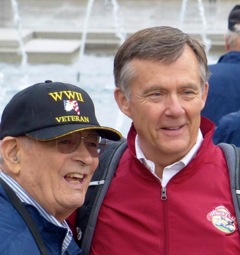 “I know in my heart that they are getting a final warm and loving experience they NEVER imagined would come their way. They are so appreciative, sometimes their gratitude just breaks my heart. Can you imagine a 98-year old veteran who fought on Saipan, or in the Battle of the Bulge, or survived a dozen bombing raids over Germany saying about the trip, ‘That was the best I’ve ever been treated in my life,’? To me, it’s worth every bit of effort.”
“I know in my heart that they are getting a final warm and loving experience they NEVER imagined would come their way. They are so appreciative, sometimes their gratitude just breaks my heart. Can you imagine a 98-year old veteran who fought on Saipan, or in the Battle of the Bulge, or survived a dozen bombing raids over Germany saying about the trip, ‘That was the best I’ve ever been treated in my life,’? To me, it’s worth every bit of effort.”
PRECIOUS CARGO, NO ACCIDENTS
Honor Flight #8 finally lands at Baltimore-Washington International Airport well after 9pm, not 5pm as planned. The procedure for getting the veterans and their guardians off the plane takes more than an hour — it requires the coordinated assistance of the entire staff of sixteen who are trained and experienced and exceedingly patient as the heroes of a long past era slowly shuffle (or are carried) down the aisle. At the terminal gate about half of the men and women are matched-up with wheelchairs, their guardians never more than an arm’s length from their side. They stream through the airport to the greeting of a military welcoming committee and then cheers and applause of late night travelers, complete strangers, who spontaneously thank them for their service.
“This is the most organized Honor Flight I’ve seen, it’s amazing,” says Joe Fry, a bus captain and veteran of several flights, “Al works 24 hours a day, seven days a week in the month before a trip, he’s into it 110-percent.”
“Yes, I’d say his main trait is intensity,” agrees his wife of 41-years, Susan-Jean, “He’s just so focused on anything and everything he does. That, and his humor. People don’t realize how genuinely funny he is.”
But all the planning in the world cannot anticipate a four-hour delay of a cross- country flight for 150 passengers who have been awake since well before dawn. Or can it?
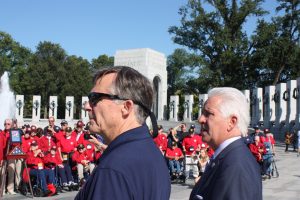
“We’re gonna be fine,” Perry tells the assembled group as they prepare to board three luxury coaches for the short trip to American Legion Post 276 in Severn, Maryland where that barbeque dinner is waiting. “But I need all my people on maximum alert, we’re late, we’re tired, and we’re hungry. That’s when accidents can happen.”
Perry is proud of his record, which has safely ferried 560 elderly men and men from one end of the country to the other and back without a single injury-causing accident. For this he thanks his staff, and the management style he perfected during a 38-year career with the Veteran’s Administration, he calls it “a strategy of overactive engagement.”
“The best part of working at the (Fresno) VA was having Al as my boss,” says Carol Barney, a retired registered nurse, and Medical Director on this and six other Honor Flights. “It’s the same with Honor Flight, he doesn’t tell you what to do, he expects certain things and then he just lets you do your job.”
A VETERAN’S VETERAN
Skiing has always been a big part of Al Perry’s life. Born in Philadelphia, raised in western Massachusetts, he attended Middlebury College in Vermont because of the skiing and soccer. It was during the height of the Vietnam War. After graduating in 1970 with a degree in political science, an Army ROTC commission as a 2nd Lt., and military active duty reporting date ten months later, he motorcycled around Euroope, ran with the bulls in Pamplona and joined the Professional Ski Patrol in Colorado. As an officer with good grades in college, he could determine his training specialty. He’d gotten a taste of emergency first aid and liked it while serving on the National Ski Patrol in Vermont and Colorado, so he chose the Medical Service Corps and Hospital Administration. Al knew from the beginning that he was not a career officer; he was happy to serve two years stateside and discharged as a first lieutenant.
In 1974, with the Arab oil embargo is playing the devil with the economy, there are few jobs, and few prospects. Al Perry bummed around Vermont for a few months sending out resumes far and wide until he finally got an offer to become the night-duty officer at the tiny VA hospital in Bedford, Massachusetts. Thus began a 38-year career that eventually would land him – eight moves later — in Fresno and earn him a reputation as one of the best hospital administrators in the United States with dozens of awards and citations from two U.S. Presidents to prove it.
BETTER LATE THAN NEVER
At 10:20pm, the rag tag army of World War II veterans and their guardians arrives at American Legion Post 276 in Severn, Maryland aboard three chartered buses. Unloading everyone takes another 20 minutes. They shuffle into the dining hall and are immediately energized by the warm and authentic welcome they receive from a cadre of military volunteers. The catered dinner is hot and delicious; it’s the first square meal anyone on the trip has eaten since they left the Central Valley many hours ago. “My big concern is that these people should have been in bed an hour ago. This is a unique group of tourists; they require very special handling. I promised them and their guardians and their families that everyone would be in Washington, well fed and in bed by ten o’clock. That was the plan.”
Instead, Al adjusts. He cuts short the usual speeches and ceremonies. They linger just long enough to savor the friendly ambiance and good food, then it’s back onto the buses for a half hour drive into Washington, DC, and at long last, check-in at the hotel well after midnight. It’s nearly two o’clock in the morning when some of the vets finally get to bed and after 4 o’clock when the medical staff finishes checking on everyone. Breakfast is pushed back from 6:00-am to 7:00-am.
“The joy for me is that every one of the people is uber-competent in what they do,” says All Perry of his Honor Flight staff, “They volunteer to do it, they pay their own way, and they are absolutely reliable. They understand protecting the dignity and honoring the sacrifices these veterans made in defense of our country.”
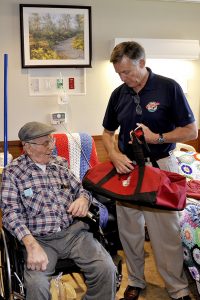
Perry has learned to pick the right staff at a succession of VA Hospitals he has administered. After stops in Richmond, Virginia; Salt Lake City, Minneapolis, Long Beach, and several other cities, Perry was asked in 1998 to repair a badly broken Veterans Hospital in Fresno. “It was one of the poorest performing VAs in the country; with poor morale, just run down. My first week on the job, on a Saturday afternoon I picked up eighteen bags of trash around the grounds and parking lot. I was embarrassed.”
As Medical Center Director, Perry set out to turn things around as he had in other hospitals. It took four years, but, “We eventually climbed up to the top five percent nationwide in performance on quality, access and patient satisfaction.”
Tom Broach, Chief Nurse Anesthesiologist, worked at the Fresno VA for twelve years under Al Perry, “He was always out and about in the hospital. You’d see him down in the laundry room or the boiler room working alongside staff and next thing you knew he’d be up in the O-R scrubbing in to watch a surgery. He wanted to know everything that was going on and he put his hand on every facet of the hospital.”
“Part of it is just like Honor Flight, getting the right people on the bus,” explains Perry, “After my fourth year in Fresno we had replaced or reassigned 85 percent of the department heads and certain key staff and we began to really move forward.”
By 2012 Perry was at the top of his game, he retired as a hospital CEO after 40 years of federal service – two years in the army and 38 years with the VA. “But I had a lot of runway ahead, and a pretty full bucket list.” He jumped right into consulting and Executive Coaching. He stepped up his volunteer work to bring Veterans programs to Break The Barriers program and expanded his participation in the annual VA-Disabled American Veterans Winter Sports Clinic in Aspen, Colorado to teach skiing to blind Vets. He climbed and bicycled in the Alps for a few months, then returned to Europe in September 2015 to motorcycle 2,000 miles through a succession of World War II battle sites. But his life, and the lives of many, many people changed when he received a phone call in the spring of 2013.
YOU HAD ME AT HELLO
“I’d actually been talking to people about trying to start up an Honor Flight program for over a year, but the time just wasn’t right.” recalls Paul Loeffler, “Then, EECU called and said they would commit as a major supporter.” He was joined on the new Board by Riclo Guerrero, Bruce Batti, Kim Regnerus; then Jerry Fahrney of Fahrney Automotive Group came along, and other people like Christine Edwards and Patty Martin – all brought different skills. “But we still had no leader. It wasn’t until I hung up the phone after chatting with Al about a Break The Barriers event we’d both worked on in May of 2013 that it struck me! He’s the guy! So I called him back and he let me ramble on about the Honor Flight for a while, and suddenly he cut me off and said, ‘Paul, you had me at hello,’ you know, that old Jerry Maguire line.”
Actually, I couldn’t say no. I just couldn’t. I’ve been so invested during my whole career in the care and rehabilitation of the men and women who have put so much on the line for our country, I couldn’t say no.” Said Perry
“He jumped in with both feet,” said Loeffler, “He studied the organization, manuals and protocols, became expert in what other Honor Flight organizations around the country (there are 140) were doing. His history with the V-A and the contacts he had helped create a medical staff that I don’t think any Honor Flight in the country can match. He was the absolute perfect guy for the job.”
Al Perry realized very quickly that organizing and launching the first Honor Flight in October 2013 would require all of the skills and talent he had developed over the course of his career. But just about everybody who comes into his orbit agrees that he was indeed the right man for the job. “He is the most selfless person that I know,” explained two-time safety officer Lindsay Hughes, “His passion and dedication to the mission of the Honor Flight is what has made it what it is.”
“These veterans love him, they know and appreciate what he has given on their behalf.” Loeffler said, “He does it all from the goodness of his heart, he doesn’t look for attention, he goes to the V-A every weekend on his own time and sits with terminally ill patients because he wants to. I haven’t met too many people like him.”
70 YEARS OF NIGHTMARES
Day two of Honor Flight Number Eight dawns cool, crisp and bright in Washington, DC. A glorious day. Autumn sunlight washes the granite walls of the World War II Memorial in magnificient shades of gray. Yesterday’s travel hardships are instantly forgotten as the Veterans stream into the vast Memorial.
Because of their late arrival, however, the group is forced to rearrange the remainder of the day, which features a luncheon at the Air & Space Museum, then a visit to the Iwo Jima (U.S. Marine Corps) Memorial, but not the Vietnam Wall and not the Korean War Memorial.
“DIGNITY CONSISTS NOT IN POSSESSING HONORS, BUT IN THE CONSCIOUSNESS THAT WE DESERVE THEM.” Aristotle
At the formal Honor Flight banquet which is always held the night before departure for home, All Perry deftly interposes humor with gravity; patriotism with gentle military irreverence as he explains to these veterans of a nearly forgotten war that America is truly grateful for their sacrifice and service and mindful of the toll it has taken over these past seventy years.
 “He was in his foxhole, and the German bombardment was precisely calibrated to explode just above the foxholes, so that night after night, freezing bone chilling night after night, splintered trees and metal shrapnel rained down on their heads,” Al Perry describes the Honor Flight application of a man who fought the Battle of the Bulge in the Ardennes Forest in Belgium, “He said, I thought I would never see morning. Night after night, I thought I wound never see morning. And he said, I still have nightmares. This is seventy years later and he still has nightmares. I learned that story and a hundred others, here on Honor Flight.”
“He was in his foxhole, and the German bombardment was precisely calibrated to explode just above the foxholes, so that night after night, freezing bone chilling night after night, splintered trees and metal shrapnel rained down on their heads,” Al Perry describes the Honor Flight application of a man who fought the Battle of the Bulge in the Ardennes Forest in Belgium, “He said, I thought I would never see morning. Night after night, I thought I wound never see morning. And he said, I still have nightmares. This is seventy years later and he still has nightmares. I learned that story and a hundred others, here on Honor Flight.”
Al Perry is no stranger to fighting his way through the fog of war. Not once, but three times he was asked to recruit emergency teams of one hundred specialists from around the country and then organize and lead them at Federal Medical Disaster Stations for victims of hurricanes Katrina, Gustav, and Ike. He seems to thrive on conquering chaos. “I’m a bit of an organization challenge junky, I thrive on it.” Recalled Perry, “When Paul called and asked me to get Central Valley Honor Flight up and running, I couldn’t refuse. It was just my cup of tea.”
As a result, for eight successful Honor Flights, Al Perry has been the man who recruits veterans and guardians and sponsors and staff, approves all applications, trains everyone not once but twice, compiles complete lists of everything from bus assignments to special medical needs. Six months in advance of each trip, he negotiates contracts with the charter airline, charter bus services, meal providers, hotels (always near the Memorials in downtown Washington, DC), and four congressional offices. Then there is the TSA. Can you imagine herding a planeload of 150 elderly men and women and their guardians and staff and their luggage through the security lines? Thankfully, Al found a way to speed things up. He is also the complaint resolution department, special request facilitator (“Can I bring my tiny snakes on the plane?” true story), wheelchair wrangler, media liason, and collector of accolades from every corner.
And then there is the money. Each trip costs around $175,000. Part of the Honor Flight promise is to get World War II vets to Washington, DC at absolutely no cost to them. Guardians pay around $1,000 to attend, as do the volunteer staffers. Yet, fundraising is a nearly full-time aspect of the program; and it’s one that occupies a great deal of the board’s and Al Perry’s time.
IMPORTANT APPOINTMENTS
The final morning in DC finds the band of brothers and sisters watching reverently as two of their own help lay a wreath at the Tomb Of The Unknown Soldiers, an immense honor reserved by Al Perry. A high point of every Honor Flight is the time spent at Arlington National Cemetery, the Tomb of the Unknowns, and the Women in Military Service for America Memorial.
“There really are only two stops on every trip that we absolutely must make on time,” Perry said, “The World War II Memorial and the Tomb of the Unknowns. We make appointments weeks in advance, and we do not miss those appointments. Ever.”
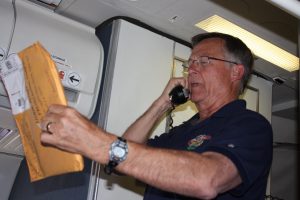
On the trip home, a mainstay of every Honor Flight is mail call at 34,000 feet, conducted two hours before landing. The staff has seen to it that every one of the sixty-one men and two women gets at several pieces of mail. With Al calling out names on the public address system, and the entire staff deployed down the center aisle, dozens of cards and letters and packages bound the old fashioned way with brown paper and twine, are passed along to the surprised, then smiling vets, then tearful vets.
There are more smiles and hugs and cheering fans when the Allegiant Airlines jet taxis to a stop at the old Castle Air Field on Wednesday evening. A crowd of over one thousand people is waiting. Paul Loeffler is there to welcome the veterans home, and so are honor guards and police details, brass bands and cheerleaders and a hundred handmade signs of love and support. Nearly all of the vets call it, “the welcome home from war that I never received.”
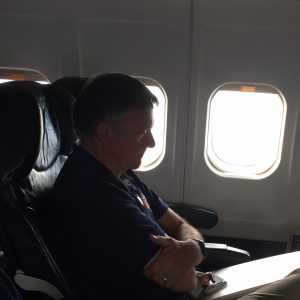 Al Perry says he plans to retire after Honor Flight #12 in October. He’ll spend more time with his girls, Susan-Jean and Meredith and Amanda, and a brand new grandson down in Southern California. But, “My career has always been about care for Veterans, I don’t think that will ever go away.”
Al Perry says he plans to retire after Honor Flight #12 in October. He’ll spend more time with his girls, Susan-Jean and Meredith and Amanda, and a brand new grandson down in Southern California. But, “My career has always been about care for Veterans, I don’t think that will ever go away.”
For an uplifting footnote, please visit http://www.justacommonsoldier.com/ “A Soldier Died Today” by A. Lawrence Vaincourt, with Tony LoBianco
